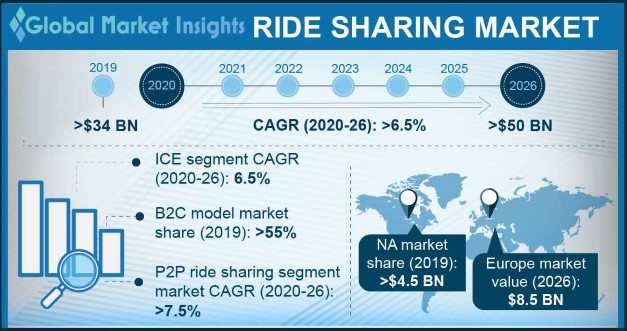Home > Automotive > Automotive Services > Shared Mobility > Ride Sharing Market
Ride Sharing Market Size
- Report ID: GMI3733
- Published Date: Oct 2020
- Report Format: PDF
Ride Sharing Market Size
Ride Sharing Market size exceeded USD 34 billion in 2019 and is anticipated to grow at over 6.5% CAGR between 2020 and 2026. Stringent vehicle emission regulations implemented by government authorities across the globe are increasing the adoption of shared mobility solutions for routine commute.
Growing safety concerns related to the usage of public transport facilities among commuters are fueling the rideshare services demand. Overcrowded public transport facilities including subways and buses cause high level of discomfort while travelling. These facilities also pose a risk of spreading of infections and viral diseases.
Significant increase in ownership of private cars coupled with insufficient network of roads in populated cities has led to a rapid increase in traffic congestion. According to the industry update by the Federal Highway Administration, congestion on roads takes up more than 37% of the travel time of daily commuters in the U.S. High traffic congestion in cities has increased the overall travel time by an average of 3.5 hours over the last 20 years. Shifting preference toward reducing the daily travel time is driving the ride sharing industry statistics.
| Report Attribute | Details |
|---|---|
| Base Year: | 2019 |
| Ride Sharing Market Size in 2019: | USD 34 Billion |
| Forecast Period: | 2020 to 2026 |
| Forecast Period 2020 to 2026 CAGR: | 6.5% |
| 2026 Value Projection: | USD 50 Billion |
| Historical Data for: | 2016 to 2019 |
| No. of Pages: | 150 |
| Tables, Charts & Figures: | 130 |
| Segments covered: | Business Model, Application |
| Growth Drivers: |
|
| Pitfalls & Challenges: |
|
The major factor hampering the market growth is the limited availability of technology and supportive infrastructure. The unavailability of convenient parking spots and pick-up & drop locations for cars in densely populated cities is challenging the wide adoption of carpooling services. One of the major barriers of entry for new market players is the high investment required to develop a technological support in terms of mobile applications and location tracking.
The rapidly spreading COVID-19 pandemic is adversely impacted the ride sharing industry. Social distancing norms and regulations implemented by government and healthcare authorities encourage citizens to maintain a two-meter distance from other persons for safety. This has restricted the usage of ride sharing services for daily commute. Users prefer to travel in their own vehicles due to health and safety concerns, hampering the market size in 2020. The impact of this industry challenge is expected to reduce impelled by the increasing sanitization and safety measures undertaken by companies.

